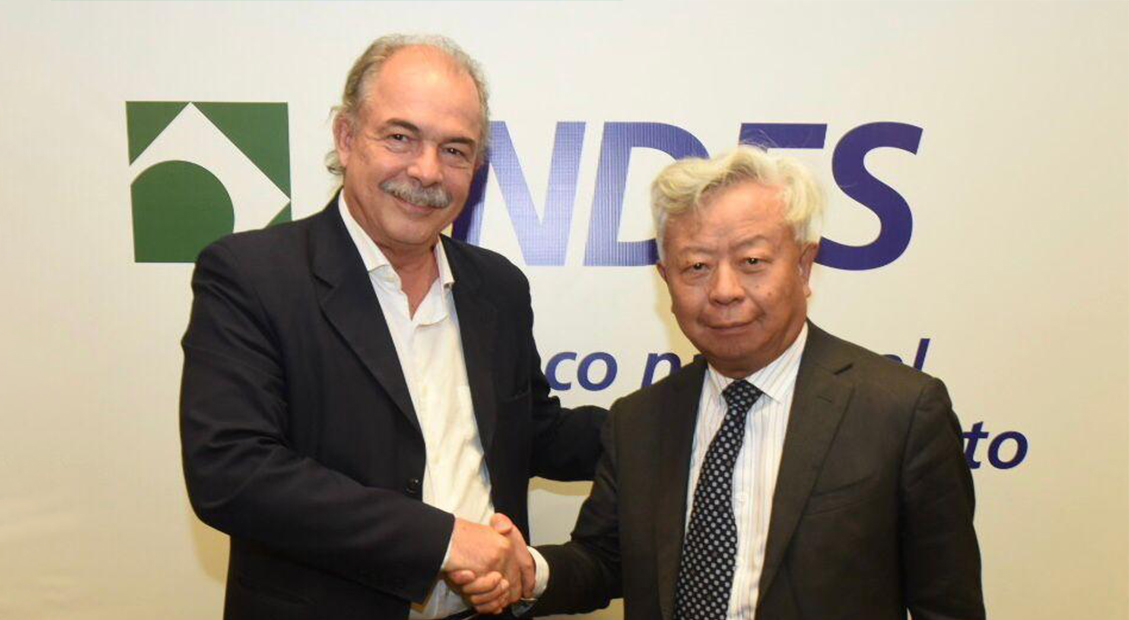AIIB, BNDES Forge Strategic Partnership to Drive Sustainable Infrastructure Development in Asia and Latin America – News – AIIB
AIIB, BNDES Forge Strategic Partnership to Drive Sustainable Infrastructure Development in Asia and Latin America ... Asian Infrastructure Investment Bank


The Asian Infrastructure Investment Bank (AIIB) and the Banco Nacional de Desenvolvimento Econômico e Social (BNDES) Sign MOU to Promote Sustainable Development

Introduction
The Asian Infrastructure Investment Bank (AIIB) and the Banco Nacional de Desenvolvimento Econômico e Social (BNDES) have signed a Memorandum of Understanding (MOU) to deepen cooperation on financing sustainable development and promoting regional cooperation.
Cooperation Areas
The MOU was signed by AIIB Vice President, Investment Operations (Region 2) Konstantin Limitovskiy and BNDES Managing Director Natalia Dias. AIIB and BNDES will explore opportunities for co-financing and co-investment in projects and programs related to infrastructure, trade and connectivity with Asia, climate and other areas of mutual interest. Both institutions will also collaborate on project origination and resource mobilization, in addition to knowledge exchange related to strategies and policies toward the achievement of Sustainable Development Goals.
Enhanced Collaboration for Sustainable Development
“We are thrilled to formalize this MOU with BNDES, a crucial institutional partner in Brazil and beyond,” said AIIB Vice President Limitovskiy. “This partnership will enhance collaboration and support projects and initiatives that drive sustainable development and foster economic growth in Asia, Latin America and beyond. By leveraging our combined expertise and resources, we can effectively contribute to addressing infrastructure challenges and promote economic progress.”
“Brazil holds the highest share of clean electricity among G20 nations, but we need to transform this competitive advantage into the ability to attract new investments and add value to the industrial and productive chains,” said BNDES President Aloizio Mercadante. “The partnership with AIIB is important for our knowledge exchange, expanding opportunities and partnerships that will help Brazil and the world have a greener economy.”
“This Memorandum of Understanding is an important milestone in our international funding strategy,” said BNDES Managing Director Natalia Dias. “It facilitates the presence of a major global financial institution, such as AIIB, to jointly leverage resources for sustainable development in Brazil and Asia.”
About AIIB
The Asian Infrastructure Investment Bank (AIIB) is a multilateral development bank whose mission is financing the Infrastructure for Tomorrow—infrastructure with sustainability at its core. We began operations in Beijing in January 2016 and have since grown to 109 approved members worldwide. We are capitalized at USD100 billion and Triple-A-rated by the major international credit rating agencies. Collaborating with partners, AIIB meets clients’ needs by unlocking new capital and investing in infrastructure that is green, technology-enabled and promotes regional connectivity.
About BNDES
Throughout its 71-year history, BNDES has been the main government instrument to promote long-term investments in the Brazilian economy, driving sectors and topics relevant to the country’s development, such as economic and social infrastructure, new industrialization, environment, and climate. Through its actions, the Bank works towards reducing inequalities, generating employment and income, and fostering social inclusion, within the necessary transition to a low-carbon economy. BNDES is one of the main financiers of micro, small, and medium-sized enterprises and, in times of crisis, it also acts countercyclically, as one of the formulators of solutions for economic growth recovery.
BNDES is currently the world’s largest financier of renewable energy, according to data from the Bloomberg NEF research organization, with credits totaling around US$35 billion from 2004 to 2022. In 2023, BNDES was recognized as the most transparent federal public institution in Brazil, in a survey conducted by the Association of Members of the Courts of Accounts of Brazil (Atricon), and as one of the world’s public development institutions with the greatest variety of methods to monitor and evaluate the effectiveness of its own actions, by The Montreal Group.
SDGs, Targets, and Indicators
| SDGs | Targets | Indicators |
|---|---|---|
| SDG 9: Industry, Innovation, and Infrastructure | 9.1 Develop quality, reliable, sustainable, and resilient infrastructure | – Investment in infrastructure projects – Co-financing and co-investment in infrastructure projects |
| SDG 13: Climate Action | 13.1 Strengthen resilience and adaptive capacity to climate-related hazards | – Investment in climate-related projects – Collaboration on climate-related initiatives |
| SDG 17: Partnerships for the Goals | 17.6 Enhance North-South, South-South, and triangular regional and international cooperation on and access to science, technology, and innovation | – Collaboration on project origination and resource mobilization – Knowledge exchange related to strategies and policies toward the achievement of Sustainable Development Goals |
1. Which SDGs are addressed or connected to the issues highlighted in the article?
The SDGs addressed or connected to the issues highlighted in the article are SDG 9: Industry, Innovation, and Infrastructure, SDG 13: Climate Action, and SDG 17: Partnerships for the Goals.
2. What specific targets under those SDGs can be identified based on the article’s content?
The specific targets under those SDGs that can be identified based on the article’s content are:
- SDG 9.1: Develop quality, reliable, sustainable, and resilient infrastructure
- SDG 13.1: Strengthen resilience and adaptive capacity to climate-related hazards
- SDG 17.6: Enhance North-South, South-South, and triangular regional and international cooperation on and access to science, technology, and innovation
3. Are there any indicators mentioned or implied in the article that can be used to measure progress towards the identified targets?
Yes, there are indicators mentioned or implied in the article that can be used to measure progress towards the identified targets:
- Investment in infrastructure projects
- Co-financing and co-investment in infrastructure projects
- Investment in climate-related projects
- Collaboration on climate-related initiatives
- Collaboration on project origination and resource mobilization
- Knowledge exchange related to strategies and policies toward the achievement of Sustainable Development Goals
SDGs, Targets, and Indicators
| SDGs | Targets | Indicators |
|---|---|---|
| SDG 9: Industry, Innovation, and Infrastructure | 9.1 Develop quality, reliable, sustainable, and resilient infrastructure | – Investment in infrastructure projects – Co-financing and co-investment in infrastructure projects |
| SDG 13: Climate Action | 13.1 Strengthen resilience and adaptive capacity to climate-related hazards | – Investment in climate-related projects – Collaboration on climate-related initiatives |
| SDG 17: Partnerships for the Goals | 17.6 Enhance North-South, South-South, and triangular regional and international cooperation on and access to science, technology, and innovation | – Collaboration on project origination and resource mobilization – Knowledge exchange related to strategies and policies toward the achievement of Sustainable Development Goals |
Behold! This splendid article springs forth from the wellspring of knowledge, shaped by a wondrous proprietary AI technology that delved into a vast ocean of data, illuminating the path towards the Sustainable Development Goals. Remember that all rights are reserved by SDG Investors LLC, empowering us to champion progress together.
Source: aiib.org

Join us, as fellow seekers of change, on a transformative journey at https://sdgtalks.ai/welcome, where you can become a member and actively contribute to shaping a brighter future.







